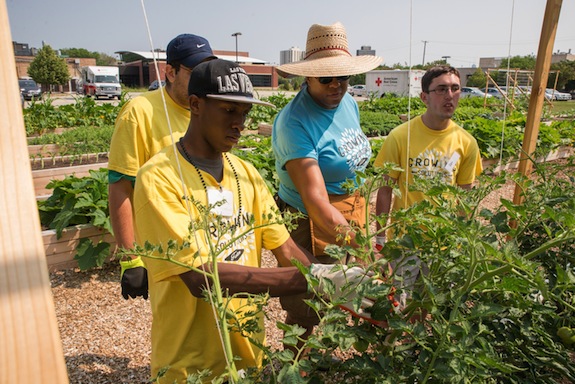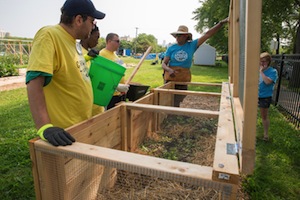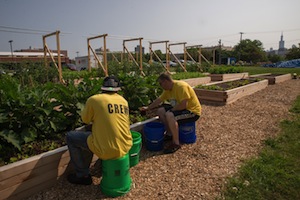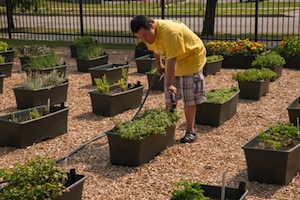| « Seafood-Inspired Tacos: From Streets of Tijuana to Wicker Park | Friday Foodpic: White Truffles » |
Gardening Thu Nov 06 2014
Autism Finds A New Solution in Local Urban Garden
 On a movie theater project he oversaw years ago, Alan Lake experienced first-hand what the kitchen could do to someone with autism and other developmental disorders.
On a movie theater project he oversaw years ago, Alan Lake experienced first-hand what the kitchen could do to someone with autism and other developmental disorders.
"A state agency approached me to employ several candidates. We hired a couple of young adults and the training culminated with a week of having a representative from the agency attending as liaison before leaving anyone on their own," said Lake, a local chef and fellow Drive-Thru writer. "They were very upfront in telling us what we could or could not expect in our new charges, both in behavior and abilities."
Two workers became ticket takers, others answered phones or ran errands around the facility. One with Aspergers Syndrome, whose social skills Lake noted left something to be desired, loved watching the Food Network and wanted to work in the kitchen. Lake put him in the pantry where his job was to take inventory of numerous items on a prep sheet and prep and plate whatever was needed.
"He started slow but blossomed shortly after his minders left," said Lake. "Within months he was cha-chaing to the music I played in the kitchen and even going out with the staff on occasion. Months later, though not the life of the party, he'd pretty much extracted himself from his shell and was very much a regular guy."
Lake says agency reps came back saying they couldn't believe what progress he'd made, and that he was like the poster boy for the program -- never figuring he'd function as highly as he did.
"I don't know if they were being conservative in estimating his abilities or if he just rose to the occasion because I needed him to, as often happens in a restaurant."
As parents of an autistic son, Chicagoan's Julie and Michael Tracy know the impact of autism and understand the gap in the system between childhood and adulthood.
According to the Centers for Disease Control and Prevention, about 1% of the world population has an autism spectrum disorder, and prevalence in the U.S. is estimated at 1 in 68 births. It is one of the fastest growing developmental disorders with 1 to 1.5 million Americans estimated to be on the spectrum. Outside of the family burden, it also poses a huge economic burden as the lifespan cost per person is estimated at $2.4 million to $3.2 million, largely driven by the costs of care, special education and social services and reduced employment opportunities. With prevalence rising, that cost is expected to increase.
"Young adults with autism are acutely aware of their differences, and most of them feel a tremendous sense of isolation and confusion about social connections and cues that they don't naturally understand," said Julie Tracy.
This disconnect leads to many young adults on the spectrum struggling to successfully make the transition into steady employment and to an independent lifestyle outside of their caretaker's home regardless of mental capacity, otherwise know as floundering.
Seeing the social and economic need for addressing the challenges around adult autism, the Tracy's launched the Julie and Michael Tracy Foundation (JMTF) and the Urban Autism Solution's Program in 2012 in partnership with the Rush University Medical Center. The Foundation provides residential space, social networking and workforce development opportunities and is advancing research around adult autism through hosted symposiums.
 At the center of their vocational arm of the program is the Growing Solutions Farm, which is carrying on the proverb "give a man a fish and you feed him for a day; teach a man to fish and you feed him for a lifetime." Located on a 1.2 acre plot of land in UIC's Illinois Medical District, the garden launched this past May and now has 28 16-foot raised cedar beds, 50 smart pots and 48 earth boxes. Its main purpose outside of farming is to provide internships for residents of Project 1212 -- JMFT's residential program -- CPS students from Al Raby High School, students from the Easter Seals Therapeutic School for Autism and private applicants.
At the center of their vocational arm of the program is the Growing Solutions Farm, which is carrying on the proverb "give a man a fish and you feed him for a day; teach a man to fish and you feed him for a lifetime." Located on a 1.2 acre plot of land in UIC's Illinois Medical District, the garden launched this past May and now has 28 16-foot raised cedar beds, 50 smart pots and 48 earth boxes. Its main purpose outside of farming is to provide internships for residents of Project 1212 -- JMFT's residential program -- CPS students from Al Raby High School, students from the Easter Seals Therapeutic School for Autism and private applicants.
"Our farm is unique because it's in the middle of Chicago, designed for adults with autism and developmental disabilities with a specific workforce development component. There are existing farms, but they are much more rural."
On my visit to the farm in early in September, I got a peek into what they are doing.
"Hello!" exclaimed a young man likely no older than 20, waving his hand aggressively in the air as I walked up. His peers chimed in choreographically. I returned the hello and they all went back to their tasks. That was the end of our conversation.
"We had to teach them that," said Vocational Director and job coach, Antonio Campos, who manages the day-to-day training of the young adults. "It's something that adults without autism take for granted; that these young adults don't necessarily understand that saying hello is what you do when you walk into work. They don't immediately grasp the social cues that are so ingrained in all of us."
 Campos has worked with various disabilities, including autism, since 2000, and his cumulative experience has led him to finding an effective formula by building a program around structure, social activity, repetition and tasks.
Campos has worked with various disabilities, including autism, since 2000, and his cumulative experience has led him to finding an effective formula by building a program around structure, social activity, repetition and tasks.
One element is the "meet and greet" at the beginning of the day. Each participant is given a ball and the opportunity to talk about a topic of their choice while they walk around the farm before passing the ball along to someone else. The students then independently split into their assigned groups and check the board for the tasks of the day. The groups are designed by Campos so that each has a stronger leader to balance those more challenged on the spectrum.
"I think the formula is having a structured day, and making sure all the staff know it and follow it," said Campos. "I also provide with visual supports for individuals that may be having a tough day behavior wise."
 All this would not be possible without the green thumb of head gardener and farm operations manager, Gwenne Godwin, who, with the help of the students, has built the garden from the ground up.
All this would not be possible without the green thumb of head gardener and farm operations manager, Gwenne Godwin, who, with the help of the students, has built the garden from the ground up.
"The participation of the students was vital in the creation of the farm," said Godwin. "They planted 95 percent of the plant material and laid compost in at least half of the planting beds. The addition of a new hoop house now offers lots of new educational experiences for the students, such as propagation, working with a different style of raised bed and the introduction of season extension techniques. It's very exciting."
Beyond teaching the adults vocation skills and teamwork, Godwin has also exposed them to proper nutrition and a palate with her Farmer's Treat Day.
"I wanted to provide a new culinary experience for the students," said Godwin. "For example, I brought in kale chips, zucchini bread, carrot juice and watermelon with a squeeze of lime and a touch of salt. I also did a few culinary studies such as a study in salsa and a study in pumpkin, which involves taking one ingredient and using it in many ways. The students were open to trying everything... maybe that's the gift."
The program has already seen success, particularly in one 21-year-old with significant autism and mental health issues who has been in the program and an intern on the farm since June. Despite family support, he was still falling through the cracks. Since joining, however, he hasn't been hospitalized and has even excelled.
"He's able to come to work every day on time and has progressed to giving farm tours to government officials," said Tracy. "He is more verbal and shows significant engagement and hasn't had any behavior issues since. Plus he just looks happy. I think he feels a sense of accomplishment."
 Making programs like this more accessible involves resources, and the Illinois-based National Garden Bureau is helping the Growing Solutions Farm achieve expansion by partnering with the farm early this summer with their newly launched "Growing for Futures" philanthropic program established to help build therapeutic gardens across the country through fundraising. The current campaign has a goal of raising $50,000 and would help Godwin turn the farm, now closed for the season, into a year-round initiative and help expand volume, allowing for more young adults to participate. To date, the program, which ends in December, has raised about $16,000 in cash and product donations.
Making programs like this more accessible involves resources, and the Illinois-based National Garden Bureau is helping the Growing Solutions Farm achieve expansion by partnering with the farm early this summer with their newly launched "Growing for Futures" philanthropic program established to help build therapeutic gardens across the country through fundraising. The current campaign has a goal of raising $50,000 and would help Godwin turn the farm, now closed for the season, into a year-round initiative and help expand volume, allowing for more young adults to participate. To date, the program, which ends in December, has raised about $16,000 in cash and product donations.
"National Garden Bureau chose this therapeutic garden because we believe that gardening can be more than just tending flowers," said Diane Blazek, executive director of National Garden Bureau. "Gardening as an activity is very good for the body, mind and soul and we've seen many examples of that already with the young adults working at the farm."
And Godwin notices that the students are more confident and outgoing than they were before, noting that they are more social with visitors and have become supportive of each other with some taking on and excelling in leadership roles. "We have a mind, body, spirit connection with the earth," said Godwin about the garden's impact on the students. "Working with the earth and witnessing those connections as I have done, is just a testament to that fact."
The foundation is working on collecting data that can demonstrate what programs like JMTF and the Growing Solutions Farm can do to address the challenges faced by adults with autism. While their goal is to teach basic workforce and social development skills, maybe they are also shaping the next future stars of Chicago's food industry.
Said Lake, "A kitchen can be good place for an individual of this nature. You often get pushed into situations where you need to rally -- put your head down, dig yourself out; meticulous piecework that needs soldiers, not generals. The kid I hired was a good employee -- polite and punctual and we had few if any issues. He was grateful as well, something you don't often see from an employee. I'd do it again in a minute. I just treated him like one of the gang, and after a while, he was. "
While we tend to look to food as a means to an end or place the culinary arts on a pedestal, programs like the Growing Solutions Farm, the work of the National Garden Bureau, success stories like Lake's and even our own personal experiences around food can exemplify what is possible when we step back from viewing what's on the plate as something that sustains us to something that has a deeper cultural and socioeconomic narrative. Developmental disabilities present obvious social and economic challenges, but solutions to problems are sometimes surprisingly found in the most unexpected places, like on a small urban farm in the middle of Chicago; a young adult discovering how to plant and grow. Indeed on a basic level food might just feed us, but can we image the possibilities it can offer to fix the pieces of us that are broken.
Click here to learn more about the Growing for Futures fundraiser and to make a donation.
Photos courtesy of National Garden Bureau.








